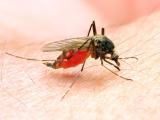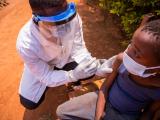Nov 1, 2010 (CIDRAP News) – A collection of articles published recently in The Lancet lays out a daunting array of obstacles to the global elimination of malaria, including the lack of an effective vaccine, and suggests that the achievement remains decades away.
"When confronting malaria, elimination is worthy, challenging, and just possible," write Lancet editors Pam Das and Richard Horton in a commentary. "But it must be pursued with balance, humility, and rigorous analysis. Malaria will only be truly eliminable (or eradicable) when an effective vaccine is available."
The reports say that 109 countries are free of malaria, with 79 having achieved that since 1945, but another 99 countries are still battling the disease. Thirty-two of those 99 have started to eliminate it, while 67 are working to control it.
Elimination, as Das and Horton note, means "interrupting malaria transmission at a national or regional level," not to be confused with eradication. "Malariologists remain divided about this objective," they add. Some believe that an opportunity to eliminate the disease exists, while others worry that raising expectations and then failing—as has happened before—may set malaria control back.
Authors of the Lancet articles generally endorse the existing three-pronged global strategy to fight malaria: aggressive control in high-burden regions, "progressive elimination" on the edges of malaria-endemic regions to "shrink the malaria map," and research to improve diagnostics, drugs, insecticides, and vaccines.
Using lessons from the global malaria eradication program of the 1950s and 1960s, a group led by Andrew J. Tatem of the University of Florida in Gainesville assessed which countries have the best chance of eliminating the disease. Their general conclusion is that the goal is most feasible in the Americas and least feasible in sub-Saharan Africa.
On the matter of paying for the malaria battle, another team of experts suggests that eliminating the disease won't necessarily save money, at least on a 50-year time horizon. They compared the estimated costs of eliminating versus effectively controlling malaria in five different locations and found that the probability that elimination would save money over 50 years ranged from 0% to 42%, with only one site showing savings.
The findings show that financial savings should not be the primary reason for elimination, "but that elimination might still be a worthy investment if total benefits are sufficient to outweigh marginal costs," says the article by Oliver Sabot, of the Clinton Health Access Initiative in Boston, and colleagues.
Countries that shrink their malaria burden to "low-endemic" status should carefully weigh the risks, benefits, and feasibility before deciding to take aim at elimination, says a commentary by Richard A. Feachem of the University of California, San Francisco, and colleagues.
Feachem also points out the importance of multicountry approaches to controlling malaria, since travel and migration often lead to malaria importation. Regional collaborations are often talked about, but they are rare in practice, he says.
The articles outline a number of scientific and technical obstacles to malaria elimination.
J. Kevin Baird of the Eijkman-Oxford Clinical Research Unit in Jakarta writes that malaria is not one but many diseases, yet malaria treatment efforts have "focused on asexual blood stages of Plasmodium falciparum to the exclusion of the many other malarias." There is only one drug, primaquine, for these other forms of the disease, and it is toxic for some patients, he says.
"To achieve elimination, a wide range of silent malarias will need to be dealt with," Baird asserts. "An anachronistic strategy focused on one malaria and the presumption of accompanying illness and diagnosis should be discarded."
In a similar vein, Kevin Marsh says scientific understanding of P vivax malaria epidemiology is very limited, even though P vivax is the main or a major part of the problem in the 32 countries now trying to eliminate malaria.
"All the easy stuff has been done and it is extremely unlikely that the endgame will be closed without an increased understanding of parasite biology," writes Marsh, of the Kenya Medical Research Institute–Wellcome Trust Collaborative Programme in Kenya.
Das and Horton warn that the quest for elimination must not come at the expense of current control efforts using such tools as insecticide-treated bed nets and antimalarial drugs.
They recall the successful battle to eradicate smallpox decades ago and write that the kinds of qualities and strategies used then must be brought to bear against malaria today.
See also:
The Lancet "online first" page with links to articles and commentaries on malaria elimination
Das and Horton commentary
Tatem et al article abstract
Sabot et al article abstract
Feachem et al commentary
Baird commentary
Marsh commentary


















